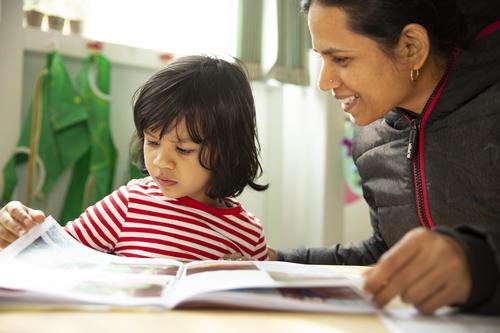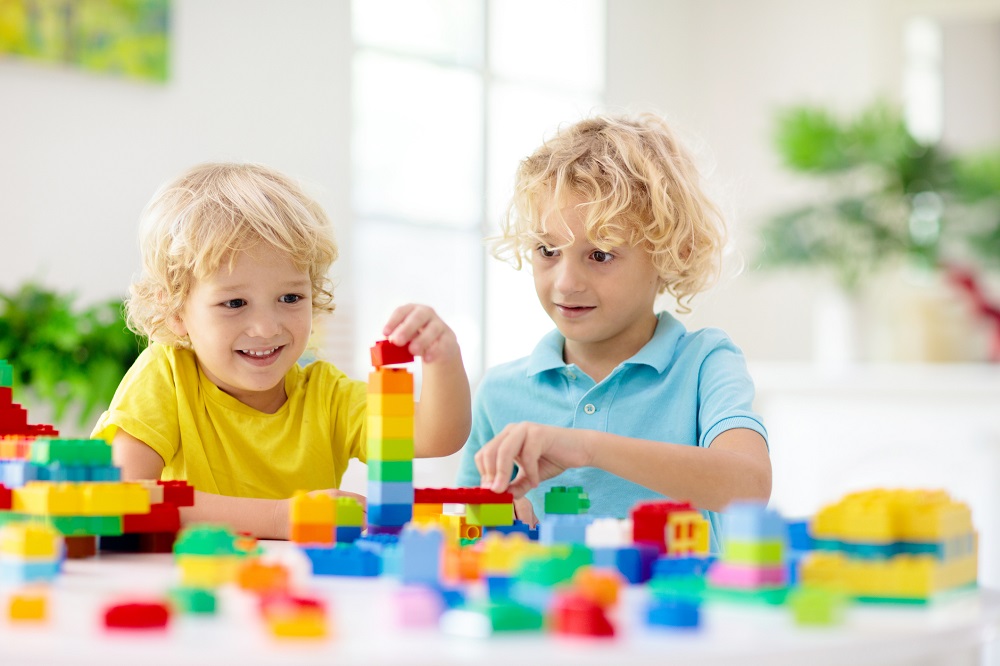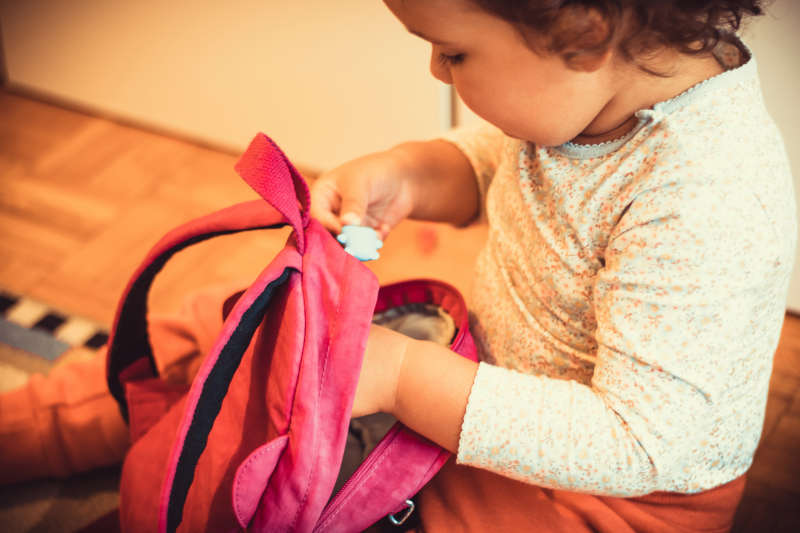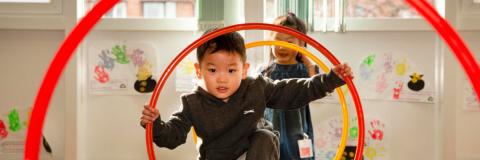Leaving your wee one in childcare for the first time can be hard. But a chat with your child’s key worker or childminder about the best ways to help your child feel settled should help you feel a bit more relaxed and reassured.
Preparing for the first day
Before they've started, you might be feeling nervous about how they'll settle in or be worried about how you'll feel when you leave them for the first time. But you might also be looking forward to them getting their first taste of independence and getting yourself some extra time to work, study or get through the huge to-do list.
Other parents across Scotland have given us their tips and ideas for how to get their wee ones (and themselves!) feeling good about starting childcare.
Tips for getting ready for the first day
Tip #1: Point it out when you walk past
“Sometimes we’d take a wee wander past the childminder's on the way to the shops or a friend’s house, it was great if the kids were all out playing as he got to see them all having fun and being with their friends. It got him excited about starting there.”
Tip #2: Talk about it with your child
“If we were reading a story or watching something on TV together, that had a character in a nursery, I’d point out the fun things they were doing, and chat about all the things to do there.”
Tip #3: Get really excited about it

"Even if you are feeling nervous, it’s good to show your child you’re feeling really positive about their first day. Try not to show them your nerves - it might make them feel worried about starting."
Tip #4: Speak to your childcare provider and ask questions
"Asking your wee one’s key worker or childminder any questions you have before they start can really help put your mind at rest."
Tip #5: Getting them used to being away from you
"I got my Mum or Dad to take my wee one out for a couple of hours now and again, in the run up to him starting playgroup, just to get him used to the idea that when I dropped him off, I always came back! And that he could have a lovely time with other people too!"
Getting ready for the first drop off
The moment is here – the first drop off. It's a big event, especially if you haven't spent much time away from your wee one before. You might be really nervous about it, but it does usually get a lot easier with time. Below are some tips other mums and dads have tried that have helped their wee ones settle, and have helped them feel reassured.
Tip #1: Use the settling in days
Most providers will help you to organise some settling in days/a week to introduce your child to their keyworker and where they’ll be spending their time. This could be as short as an hour or two, and working up to a morning/afternoon or a whole day. They’ll usually advise as to how well they’re doing and how long they think you can be away for.
Tip #2: Keep a smile on your face

Even if you are feeling nervous about the first drop off, try not to show it. Instead, try to be excited and happy so that your toddler will be as well.
Tip #3: Tell them what's going to happen
On your way to drop off, chat to your wee one about all the fun things they might be doing that day. You could also try talking about what you’ll do when you come to pick them up at the end of the day, that way you’re reassuring them you will be back!
Tip #4: Play a game on the way in
"If I know my son’s having a clingy day and feeling nervous, I’ll play wee games with him along the way, just to take his mind off it and get him in a better mood. Even just i-spy, spot the buses, look for red cars, and he’s usually in a better mood when he arrives."
Tip #5: Give yourself enough time to get ready
It's never easy getting out the house in the morning, so getting as much ready as you can the night before, can make for a less stressful morning.
Tip #6: Keep the drop off time short
"It was really hard to do in the early days, but my daughter’s key worker suggested that I give her a big hug and kiss, tell her I’d be back at 4 o'clock, say bye bye with a smile on my face, and then leave. If she cried my instinct was to want to stay with her till she stopped, but me being there usually meant she just got clingier. So I just stayed outside for a minute or two and could see through the window that she was totally fine after a few minutes!"
Tips if you have twins, triplets or more
If you have twins, triplets or more ('multiples'), it’s a good idea to encourage their individuality when they go to nursery. For example:
- Try to talk to them individually about starting nursery, so they have a chance to share any worries without their sibling(s) there.
- Although it’s tempting to ask them to share a bag with everything they’ll need for the day, it’s nice to give them a bag each with their own spare clothes, snacks and toys.
- Get them used to doing things like going to the toilet and getting dressed by themselves.
- If they’re identical or look similar, dress them differently so the nursery staff can always tell who’s who. For example, you could give them different hairstyles or accessories in their hair, or dress them in clothes with their initials or in consistently different colours or styles.
You can find more tips and advice on the Twins Trust website.
Settling in
What the parents say
Tip #1: Seeing my twins love it
“I thought my twin girls would really struggle settling into nursery as they were both only two years old...and weren’t really speaking. But they really surprised me and took to it so well, and within about a month were starting to speak in sentences!”
Tip #2: It isn't long until they start running in
“My kids barely look back at me when I drop them off – they’re so excited to get into their favourite activities and be with their friends. I wish I could have seen them as they are now when they were first starting, it would have reassured me so much!”
Tip #3: Looking forward to meal times
“I love that they get the opportunity to try new foods, and there’s definitely loads of things that my wee boy has eaten at his childminder's (and liked!) that he wouldn’t have even gone near at home.”
Tip #4: Time for chores
“I’ve found that just having an extra couple of hours a day to catch up with piles of washing/dishes/food shopping has meant that the time I have with my kids is much more fun, as I’m not stressing about all the other stuff I still need to do.”
Tip #5: Getting structure to the day
“I’ve found that being with their childminder has given them more structure to their day, and that they’re better at understanding and following rules – I think they like that they know where they stand.”
Tip #6: Hearing about their day
“I love it when they come home and tell me a random fact that I just wouldn’t have thought they’d know age 3. Or when they bring home a piece of artwork that they’re so proud of – it’s a good way to get them talking about what they’ve been doing and learning.”
 Activities & Play
Activities & Play Behaviour
Behaviour Childcare
Childcare Development & Growing Up
Development & Growing Up Family, Friends & Relationships
Family, Friends & Relationships Feeding Your Baby
Feeding Your Baby Food & Eating
Food & Eating Health & Safety
Health & Safety Mental Health & Wellbeing
Mental Health & Wellbeing Money & Work
Money & Work Online Behaviour & Safety
Online Behaviour & Safety Pregnancy & First Days
Pregnancy & First Days School & Education
School & Education Sleep
Sleep








 Activities & Play
Activities & Play
 Money & Work
Money & Work